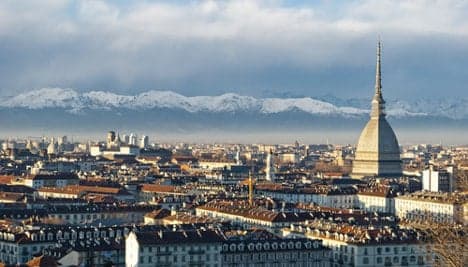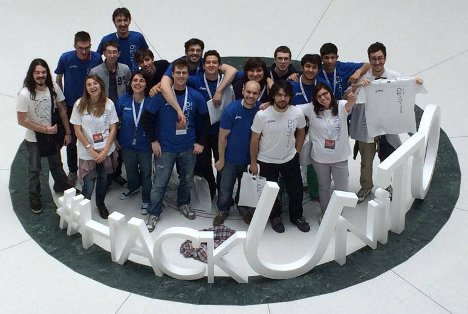How Turin is defying Italian austerity

With Italy still steeped in debt, there is little government cash to fund community projects. But the country's former capital, Turin, is once again reinventing itself. The Local finds out how.
The economic crisis feels far from the grand pillars of learning at the University of Turin, but the 18th century building belies the modern reality.
Universities and their surrounding communities are desperately short of cash, making alternative funding models a new necessity.
At the University of Turin, Rector Gianmaria Ajani has used a cash injection from a bank foundation, Compania di San Paolo, to create the “hackUniTO” project to tackle the institutions’ problems.
“The idea of hackUniTO was to open the rooms of the university, to try to change an attitude of complaining into one of proposing,” he tells The Local.
With financial support from the foundation - which grants the university €21 million annually - Ajani invited Turin politicians, citizens, students and academics to come together earlier this year and improve the campus and city.
People registered online and published their ideas on what needed to change, calling for help from people with particular skill sets. Nearly 1,500 took part, providing knowledge for free which usually would have carried a fee.
A total of 198 community projects were put forward, covering everything from attracting EU funds to making films, before groups got together in May to develop their projects on campus.

“We had groups with students, professors and politicians from local government, with no hierarchy,” Ajani says. “City hall staff, who do the routine work each day, were exposed to new ideas from students.”
“I’m happy we have more than 100 projects, which will remain. We have an attitude to think together, to try to solve a problem instead of filing a complaint,” he adds.
While it is too soon to see the impact the projects will have on the city, Ajani sees diversifying funding models as essential for the university’s survival in the age of austerity.
“Crowdfunding is also entering the way we try to self-support research projects. I think it’s a very good thing,” he says.
Sourcing non-state funding has proved controversial, however, with some of Ajani’s colleagues arguing that university work must be paid for solely by the state.
“But public funding does not exist anymore. Either you don’t do research anymore or you open it up to private donors,” he says.
Such donors are also under pressure from Italy’s economic downturn, explains Mario Gioannini from the Compagnia di San Paolo foundation.
“The impact of the crisis was twofold. After 2008 our total assets shrank substantially, and so did our spending,” he says.
Whereas the foundation’s main budget was previously for research and higher education, welfare has become its new priority.
“In the past few years we have really started paying for basic things that the state should provide, such as schools for small children.
“We pay for fundamental, basic services,” Gioannini explains, while the foundation has also come under “huge pressure” to pay for restoration work in Italy.
'Turin had to invent a new future'
Neverless, Compagnia di San Paolo still contributes one percent of the University of Turin’s budget. “It allows the university to do things that are really difficult to do with the funds they get from the government, which are already assigned,” Gioannini says.
The hackUniTO is the latest in a string of projects funded by the foundation which “break the structure of the system,” he says. They include one aimed at getting immigrants to vote and another on the regeneration of Turin’s Mirafiori Nord, a neighbourhood which lies alongside the city’s famous Fiat factory.
As Ajani notes, Turin is no stranger to adapting to difficult circumstances. “Turin was the capital [of Italy] and had to invent a new future, which is did with the automobile industry.
“Now Fiat has moved out, the city is becoming a post-industrial place,” he says, as the carmaker turns its attention to foreign factories and markets.
“There are problems, but there are many opportunities for culture, study, tourism - the new identity of the city.”
But even within this environment, the rector says the university has been “very brave” to pilot projects that go against traditional academia.
With little sign the Italian economy will turn itself around - enabling greater government funding - Ajani encourages his peers to get creative in their financing.
“I think universities remain locked in their structures,” he says. “I would suggest they try it.”
Comments
See Also
The economic crisis feels far from the grand pillars of learning at the University of Turin, but the 18th century building belies the modern reality.
Universities and their surrounding communities are desperately short of cash, making alternative funding models a new necessity.
At the University of Turin, Rector Gianmaria Ajani has used a cash injection from a bank foundation, Compania di San Paolo, to create the “hackUniTO” project to tackle the institutions’ problems.
“The idea of hackUniTO was to open the rooms of the university, to try to change an attitude of complaining into one of proposing,” he tells The Local.
With financial support from the foundation - which grants the university €21 million annually - Ajani invited Turin politicians, citizens, students and academics to come together earlier this year and improve the campus and city.
People registered online and published their ideas on what needed to change, calling for help from people with particular skill sets. Nearly 1,500 took part, providing knowledge for free which usually would have carried a fee.
A total of 198 community projects were put forward, covering everything from attracting EU funds to making films, before groups got together in May to develop their projects on campus.

“We had groups with students, professors and politicians from local government, with no hierarchy,” Ajani says. “City hall staff, who do the routine work each day, were exposed to new ideas from students.”
“I’m happy we have more than 100 projects, which will remain. We have an attitude to think together, to try to solve a problem instead of filing a complaint,” he adds.
While it is too soon to see the impact the projects will have on the city, Ajani sees diversifying funding models as essential for the university’s survival in the age of austerity.
“Crowdfunding is also entering the way we try to self-support research projects. I think it’s a very good thing,” he says.
Sourcing non-state funding has proved controversial, however, with some of Ajani’s colleagues arguing that university work must be paid for solely by the state.
“But public funding does not exist anymore. Either you don’t do research anymore or you open it up to private donors,” he says.
Such donors are also under pressure from Italy’s economic downturn, explains Mario Gioannini from the Compagnia di San Paolo foundation.
“The impact of the crisis was twofold. After 2008 our total assets shrank substantially, and so did our spending,” he says.
Whereas the foundation’s main budget was previously for research and higher education, welfare has become its new priority.
“In the past few years we have really started paying for basic things that the state should provide, such as schools for small children.
“We pay for fundamental, basic services,” Gioannini explains, while the foundation has also come under “huge pressure” to pay for restoration work in Italy.
'Turin had to invent a new future'
Neverless, Compagnia di San Paolo still contributes one percent of the University of Turin’s budget. “It allows the university to do things that are really difficult to do with the funds they get from the government, which are already assigned,” Gioannini says.
The hackUniTO is the latest in a string of projects funded by the foundation which “break the structure of the system,” he says. They include one aimed at getting immigrants to vote and another on the regeneration of Turin’s Mirafiori Nord, a neighbourhood which lies alongside the city’s famous Fiat factory.
As Ajani notes, Turin is no stranger to adapting to difficult circumstances. “Turin was the capital [of Italy] and had to invent a new future, which is did with the automobile industry.
“Now Fiat has moved out, the city is becoming a post-industrial place,” he says, as the carmaker turns its attention to foreign factories and markets.
“There are problems, but there are many opportunities for culture, study, tourism - the new identity of the city.”
But even within this environment, the rector says the university has been “very brave” to pilot projects that go against traditional academia.
With little sign the Italian economy will turn itself around - enabling greater government funding - Ajani encourages his peers to get creative in their financing.
“I think universities remain locked in their structures,” he says. “I would suggest they try it.”
Join the conversation in our comments section below. Share your own views and experience and if you have a question or suggestion for our journalists then email us at [email protected].
Please keep comments civil, constructive and on topic – and make sure to read our terms of use before getting involved.
Please log in here to leave a comment.